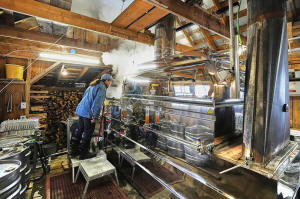Vermont maple syrup makers face uncertainty amid Canada and China tariff
chaos
[April 16, 2025] By
AMANDA SWINHART and PATRICK WHITTLE
MORGAN, Vt. (AP) — Making maple syrup in New England's fickle spring
weather can be an unpredictable business. Now President Donald Trump's
ever-changing tariff policies are adding anxiety about an industry that
depends on multinational trade.
“Any kind of disruption with our cross border enterprise, we feel it,”
said Jim Judd, a fourth-generation sugarer who owns Judd’s Wayeeses
Farms in Morgan, Vermont. “It’s uncertain enough making maple syrup.”
Judd, who has been making Vermont’s signature product since the 1970s,
says multiple countries contribute to each container of the sticky
sweetener. Stainless steel fixtures used connect sap lines and boil the
liquid into syrup can originate in China. Packaging often comes from
Italy. And the vast majority of equipment is sold by Canada, which
produces about four-fifths of the planet's maple syrup — and sells
nearly two-thirds of it to U.S. consumers.
That's why this spring's whiplash is so concerning to Judd and many
other U.S. producers in Vermont as well as New York, Maine and
Wisconsin.
Trump backed off the stiffest tariffs on most nations for 90 days
earlier this month while increasing the taxes on Chinese imports to 145%
and engaging in a lengthy back and forth with Canada and Mexico about
tariffs on their countries' goods.
Allison Hope, executive director of the Vermont Maple Sugar Makers'
Association, said they're assuming that Trump's latest position means
there is no tariff on finished maple products for now — but the
situation gets murkier when considering that necessary packaging,
equipment and materials may originate in China.
“It's like the weather in New England. You wait five minutes and it
might change,” Hope said. “Now it matters how Canada makes its equipment
and gets its materials. ... It's hard for businesses to run on a growth
mentality when there's no sense of what the industry is going to look
like in a way, in a year.”
[to top of second column] |

Donna Young checks the evaporator, one of the many pieces of
Canadian-made equipment used for producing maple syrup at Judd's
Wayeeses Farms in Morgan, Vt., on Friday, April 11, 2025. (AP
Photo/Robert F. Bukaty)
 The uncertainty is arriving in a
time of relative growth for syrup producers in the U.S. as well as
Canada. Vermont has seen an increase in production of nearly 500%
over the last 20 years as producers scaled up, new businesses formed
and U.S. consumers sought local and natural alternatives to refined
sugars, Hope said.
But disrupting trade with Canada, the maple syrup powerhouse, could
be devastating. Judd, for one, said he has spent “countless amounts
of hours and lots and lots of money” buying equipment in Canada over
the decades. Import taxes could sharply increase his costs, and
since syrup is, at essence, a luxury good, he thinks he can't raise
prices.
“We can't do this without Canadian help. We can't buy what we need
at another outlet because it's all in Canada,” Judd said. “We've
been crossing this border all my life. The recent changes we see
being imposed on the people here — we're not sure that they're all
necessary."
___
Whittle reported from Scarborough, Maine.
All contents © copyright 2025 Associated Press. All rights reserved |